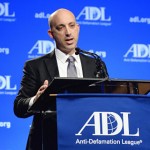by Mitchell Plitnick
I’d like to pose a question. Do you believe that someone who writes the following letter should be forced out of his position as chaplain at an Ivy League university?
To the Editor:
Deborah E. Lipstadt makes far too little of the relationship between Israel’s policies in the West Bank and Gaza and growing anti-Semitism in Europe and beyond.
The trend to which she alludes parallels the carnage in Gaza over the last five years, not to mention the perpetually stalled peace talks and the continuing occupation of the West Bank.
As hope for a two-state solution fades and Palestinian casualties continue to mount, the best antidote to anti-Semitism would be for Israel’s patrons abroad to press the government of Prime Minister Benjamin Netanyahu for final-status resolution to the Palestinian question.
(Rev.) BRUCE M. SHIPMAN
Groton, Conn., Aug. 21, 2014
One can, to be sure, disagree with the opinion Bruce Shipman, a former chaplain from Yale, expressed—I certainly do. Anti-Semitism is not the same as opposition to Israeli policies, the two are quite distinct and plenty of Jew-haters fully support even more aggressive and brutal policies either because they hate Muslims and Arabs more than Jews or because they have some apocalyptic vision of where such Jewish behavior might take the Jews.
Anti-Semitism does not increase due to Israel’s behavior. Anti-Semitic activity might, as haters see an opportunity to cloak their hate in something else. But bigotry has a life of its own. More to the point, Israelis will not behave like “good Jews” in order to stem a theoretical rising tide of anti-Semitism. That’s not why Israel should end its occupation, should end its siege of Gaza, and should recognize, with full faith, that Palestinians have the same national, civil and human rights as Israeli Jews. Politics doesn’t work this way, but civil society should be pushing for these things because they are a moral imperative. And Israel should pursue such a course because it is the only way its citizens will ever know peace and security.
So, yes, I think Shipman was wrong. But he was hardly expressing hatred towards Jews. He was speaking out of obvious concern for both Israelis and Palestinians and a hope for a peaceful resolution to the conflict. He may have been wrong about Israeli actions causing anti-Semitism, but he is not the only person who believes this and there is room for reasonable debate on that point. In any case, he was certainly not saying that Israel’s actions justified anti-Semitism. And yet, he was forced to resign.
Is this really where we’ve ended up? Yes. Ideas are fully policed on this issue. Academia, which is precisely the place that disagreements, and especially controversial ideas, are supposed to be debated with civility, has become one of the most heavily policed arenas. The recent controversy at the University of Illinois, where Professor Steven Salaita was “de-hired” because of his outspoken statements on Twitter about Israel’s massive onslaught on Gaza, has now grown to the point where it is threatening the university’s administration. Yet they have not reversed their decision to date.
It’s not like controversial views on both sides of the Israel-Palestine conflict are under such attack. Thane Rosenbaum, for example, called on Israel to kill Palestinian civilians. His op-ed in the Wall Street Journal generated a lot of controversy, but his position at New York University’s School of Law was never in danger, and I wouldn’t want it to be.
Opinions, even hateful ones, need to be out in the open. How can they otherwise be countered? Instead, when it comes to Israel, we have gone entirely in the other direction, but only on one side of the question.
Bruce Shipman, apparently, resigned “voluntarily,” not wanting to create or be in the middle of further controversy at Yale. But there never should have been any such pressure on him. There is no conceivable stretch that can turn what Shipman wrote, regardless of how much anyone disagrees with him, into hate speech. Short of that, any individual should be able to express an opinion. That is especially true about community leaders, which school chaplains obviously are, and the academic world.
So enough with the false allegations of anti-Semitism, which are insulting to those like myself who have experienced physical violence from anti-Semitism. Enough with the extremists supporting the worst Israeli policies who—apparently knowing that their case cannot withstand open debate—threaten and pressure those who raise opposing opinions (I have received death threats from such people as well).
It’s high time for everyone to agree that ideas can and should be debated. Islamophobes and others who do not acknowledge Palestinians’ basic human rights have a national platform with FOX News. More legitimate defenders of Israeli policies and those who are deeply opposed to those policies should also be able to voice their views in public. Everyone who is interested in the Israel-Palestine conflict should agree with this fair and just principle. The only ones who can’t, it would seem, are the naysayers who oppose legitimate debate. I wonder why.






Unfortunately, Israelis elected Netanyahu to represent them and he still maintains a high level of approval. So what Israel does is going to affect attitudes towards all people who identify themselves as belonging to the same ethnic/religious group. Similarly, all Americans share the blame for US interference in Middle Eastern conflicts, regardless of their personal views on foreign policy.
Actually, since announcing the ceasefire, Netanyahu’s popularity ratings have declined and he has been overtaken by Naftali Bennett, who is thought much more “hawkish” than Netanyahu.
The Zionist State continues to lurch ever more rightwards into National Judaist extremism.
I am not sure if this reply response will be posted. Like Norman, I too am not getting them in.
Yes John, yours got posted.
I get the impression that Israelis justify their actions by regarding themselves as victims, despite the evidence of the relative body counts and the great disparity in sophistication of the weapons available to each side in the dispute.
I am pleased that my one comment got posted, though I am sure I left another one or two other comments as well, which have not been placed above.
However, I cannot now recall what they said.
I think there is a difference between Jews generally, Zionists and those now infused with the crypto-fascist National Judaist ideology of Netanyahu and Bennett.
I am sympathetic to the feelings of Jewish victimhood that were generated successively after Constantine decided to adopt the fledgling Christian religion as the official state religion of the Roman Empire. From that moment on, Jews were cast as Christ-killers and subjected to centuries of hatred and persecution.
Similar rationales were employed to oppress them through pogroms across Europe right up until the late 19th Century. The ruling elites in Europe used them as unpopular front men.
Herzl decided to establish a world zionist movement after visiting Paris during the Dreyfuss trial, though it is not certain he actually witnessed any of the events that took place in France.
As a journalist, he would have been fully aware of the anti-Jewish sentiment the affair stirred up in France and this hatred motivated him to establish the ideology and practice of Zionism.
On one level, the deliberate murder and cruel treatment of Jews in Nazi Germany would make anyone fearful, even though the Zionists in Palestine and the US welcomed such behaviour as a useful recruitment tool for their own purposes and to justify illegally seizing Palestinian land..
None of this excuses the appallingly oppressive treatment the Zionists have inflicted and are inflicting upon the Palestinians from 1947 to the present day.
Two wrongs do not make a right, however much the Zionist apologists say otherwise.
Their safety lies in coming to terms with other systems of religion and belief.
The illegitimate occupation of historic Palestine and their manouevrings in the US through groups like AIPAC and ADL do them and no one else any good whatsoever.
They should all go back to where they came from in Europe and North America, and leave the Palestinians free in their own historic lands.
Until they do that, their war of occupation will never end.
For them or anyone else.
The Tel Aviv regime will never be accepted.
Only a fool can ever believe it ever will be.
Can’t quite agree with you about people going back to where they came from. Europe would be unable to cope with the return of the descendents of all those old colonists!
But wise politicians can and do find ways for people to live in peace together. A case in point is Ireland where there had been conflict with the English since the time of Cromwell and William of Orange. British prime minister, John Major, a personal hero of mine, accepted that the IRA had something to say and was prepared to listen. There is now peace and prosperity in Northern Ireland after 600 years of conflict.
Having lived a long life, I no longer have to apologize for being half Irish. I hope that, before I die, I will be able to stop apologizing for being half Jewish.